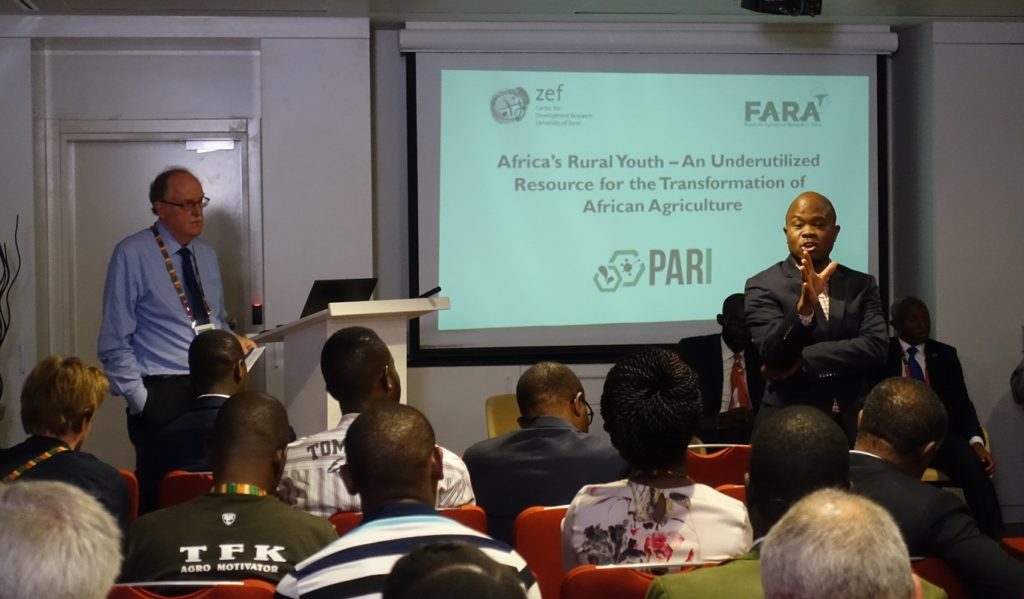PARI hosted a side-event at the African Green Revolution Forum 2018 co-organized by ZEF and FARA. Under the broad theme Africa’s rural youth – An underutilized resource for the transformation of African agriculture, the event brought together an esteemed group of speakers representing entrepreneurs, the youth, researchers and development partners to discuss how to economically engage young people in rural development and agricultural value chains in Africa.
The event was a timely addition, on the final day of the forum, adding to the rich program that discussed a variety of relevant important issues for a Unique African Green Revolution.
The prevalence of vulnerable, low-quality jobs, rather than the relatively low unemployment rates, constitutes the main labor market challenge on the continent. Given that the agriculture sector remains the most important economic sector in the region, strategies and investments that support the sector’s development and increase the human capital of rural youth can significantly improve employment opportunities and quality in the future.
The unemployment rate in Africa standards at almost 30 percent, according to data from the International Labor Organization, which also confirms that a majority of the region’s youth are facing long-term unemployment. At the same time, the working poverty in Sub-Saharan Africa affects more than 64 million youth, who have to do with less than $3.10 per day.
Even though the agricultural sector bears the potential to create numerous jobs, youth continue to shun it. The increasing numbers of youth leaving the rural areas for urban regions in the quest for better livelihoods, only to find themselves in endless job hunts, is also a reason for concern. However, a paradigm shift might be experienced with conversations now taking place on how to draw youth into the agriculture.
Key messages from the presentations by PARI researchers:
Three presentations that provided insights from PARI research on how to increase the employment and income opportunities for young people in the rural areas of Africa preceded a High-Level Panel moderated by Prof. Joachim von Braun.
- Dr. Wole Fatunbi (FARA, Nigeria) on the effectiveness of national and pan-African youth policies
‘Governments and other stakeholders need to create funding channels that would allow the rural youth to competitively participate in agriculture. Profitable farming is capital and knowledge intensive. One cannot make profit from farming without maximizing the economies of scale, and that is why there is need to support mechanization and provide training to the farmers.’
- Dr. Oliver Kirui (ZEF, Kenya) on the importance of education and technical skills
‘Rural youth are the least prepared to take advantage of the educational transformation because of the quality of education they receive and the kind of skills they acquire. The kind of training that is offered does not meet the requirements of the labour markets. It is imperative for the youth who are interested in agriculture to be equipped with skills that will make their products even more exciting to markets. There is need to provide incentives for private sector participation and adapt to emerging innovating training delivery for private companies to hire the youth. We should not just teach the young farmers to produce, but how to add value.’
- Dr. Heike Baumüller (ZEF, Germany) on the role of digital innovations in agriculture
‘Digital opportunities should be sought for youth in rural areas as a way to engage them meaningfully. Information services are useful for production planning and management of weather-related risks. The youth also need technologies to enlighten them on product pricing and trading opportunities. Price information can be beneficial but only if farmer have access to markets! More data is urgently needed to understand the impacts of digital services.’
Presentations were given by members of the high-level panel moderated by Prof. Joachim von Braun
- Dr. Yemi Akinbamijo, Executive Director, Forum for Agricultural Research in Africa
‘There is need to strengthen leadership, invest in unconventional (radical) methods (including seeking solutions outside the agriculture sector) to address Africa’s youth challenge. Encourage and prepare more youth to take up leadership. Seek collaborations across sectors and regions and partners. There is also need to have a holistic picture (system-wise approach) i.e. rural youth development in should be done hand in hand with overall agriculture development, infrastructure, markets, governance, etc.’
- Fred Swaniker, Founder and CEO, African Leadership University
‘Action must match our words. We have to learn to execute strategies, policies and plans. Infrastructure in rural areas is key for rural (youth) transformation. Business models and vocational training will attract private sector in rural areas.’
- Dr. Njack Kane, John A. Kufuor Foundation
‘There is need to engage the youth as partners, not as beneficiaries and to translate rural communities to rural cities. There is also need to adapt to climate change so as to increase adaptation. More importantly, there is need to create partnerships by institutionalizing a youth platform.’
- Ntiokam Divine, Founder and Managing Director, Climate Smart Agriculture Youth Network
‘We need creative disruptions. There is need therefore to rearrange the strategies. There is need to move from panel discussions to panels of actions.’

The ultimate goal, panelists concluded, is to have as many rural youth as possible in Africa join the quest to reverse the food insecurity crisis that has led to more than 200 million people in the continent fighting starvation. To this end, we must get leadership and governance right. Furthermore, priority strategies for countries and regions must be developed. This may be done by selecting a few value chains and focusing on them. Robust business plans must be developed, that will create jobs and leapfrog agricultural enterprises. This will serve to address intrinsic challenges in agriculture. These will give agriculture a head start.



